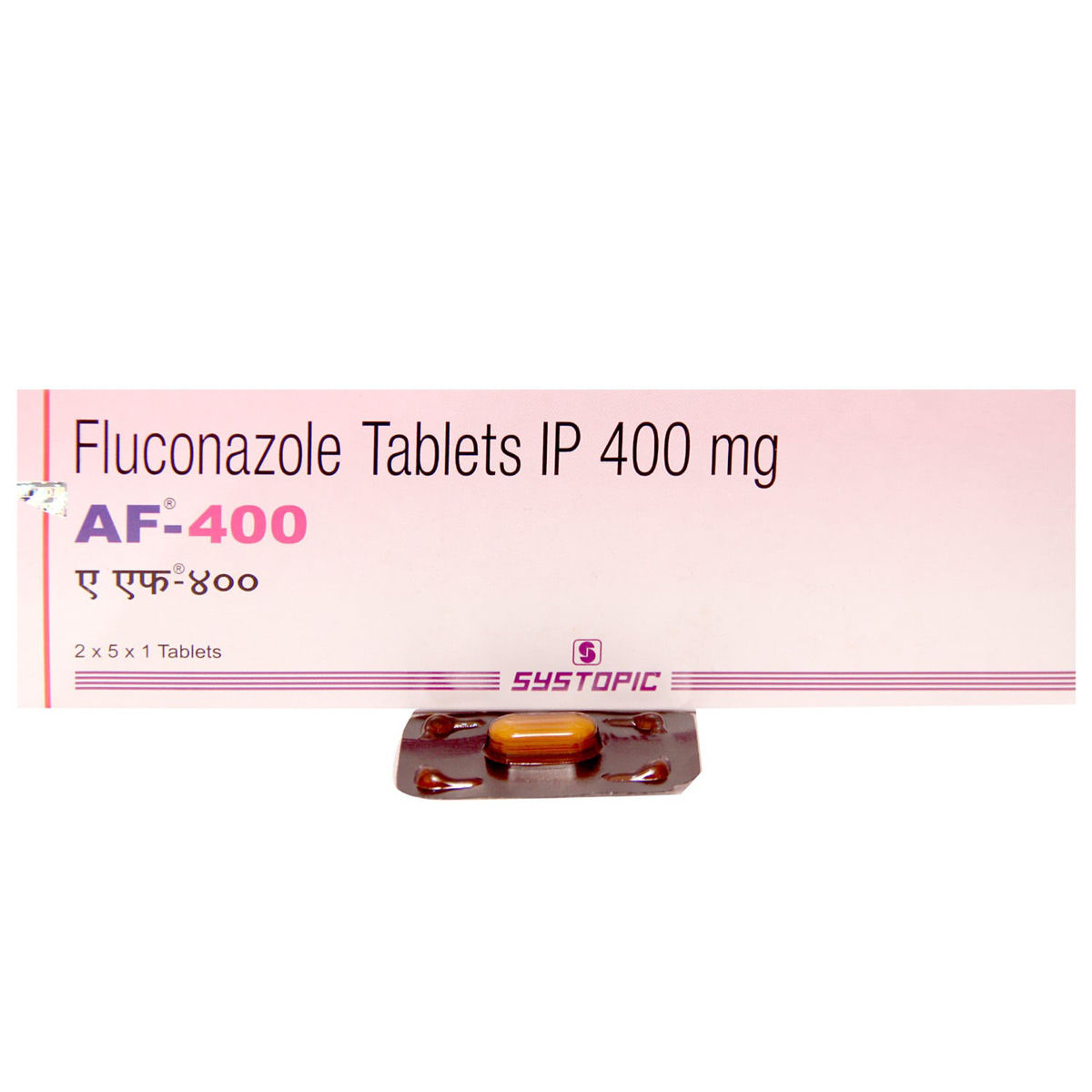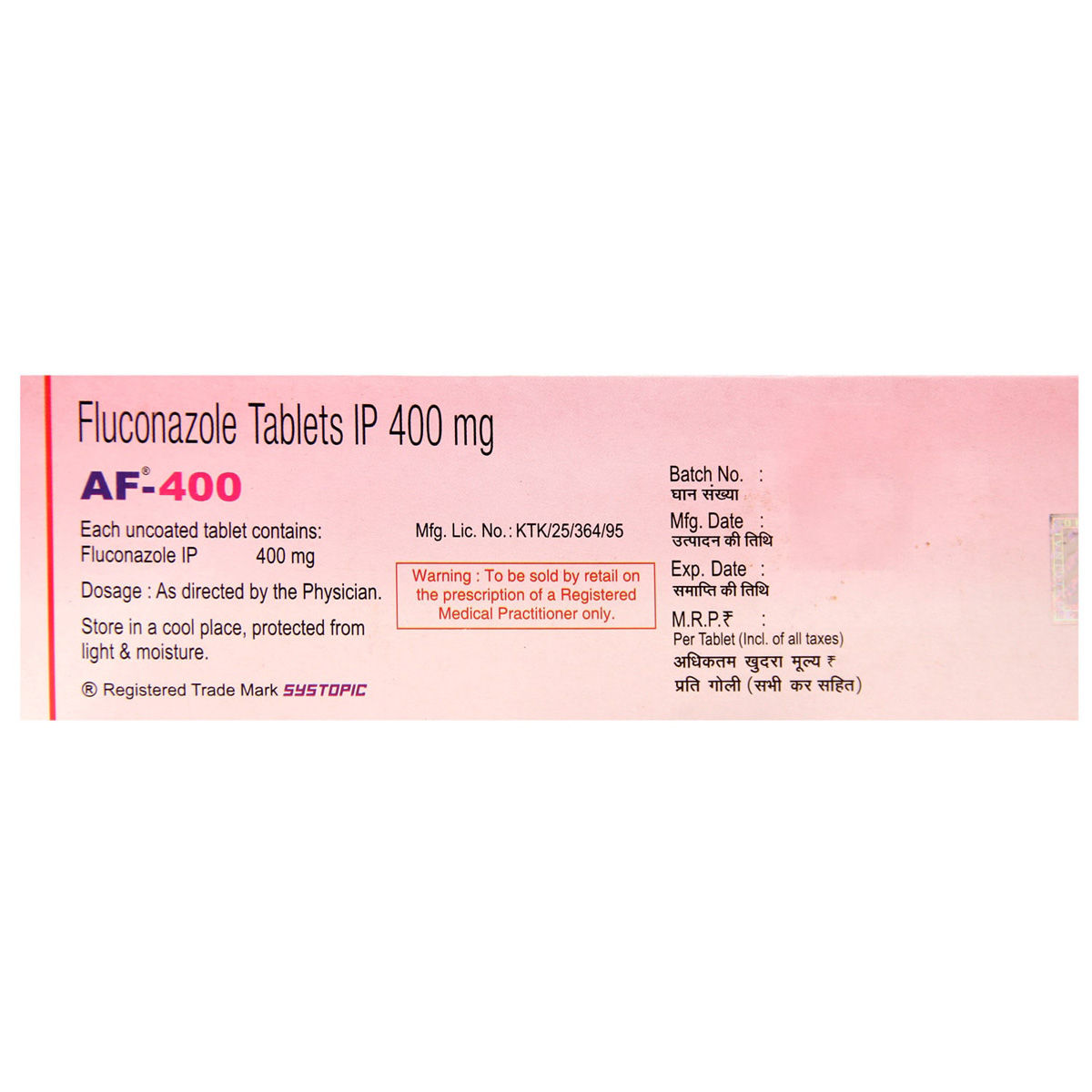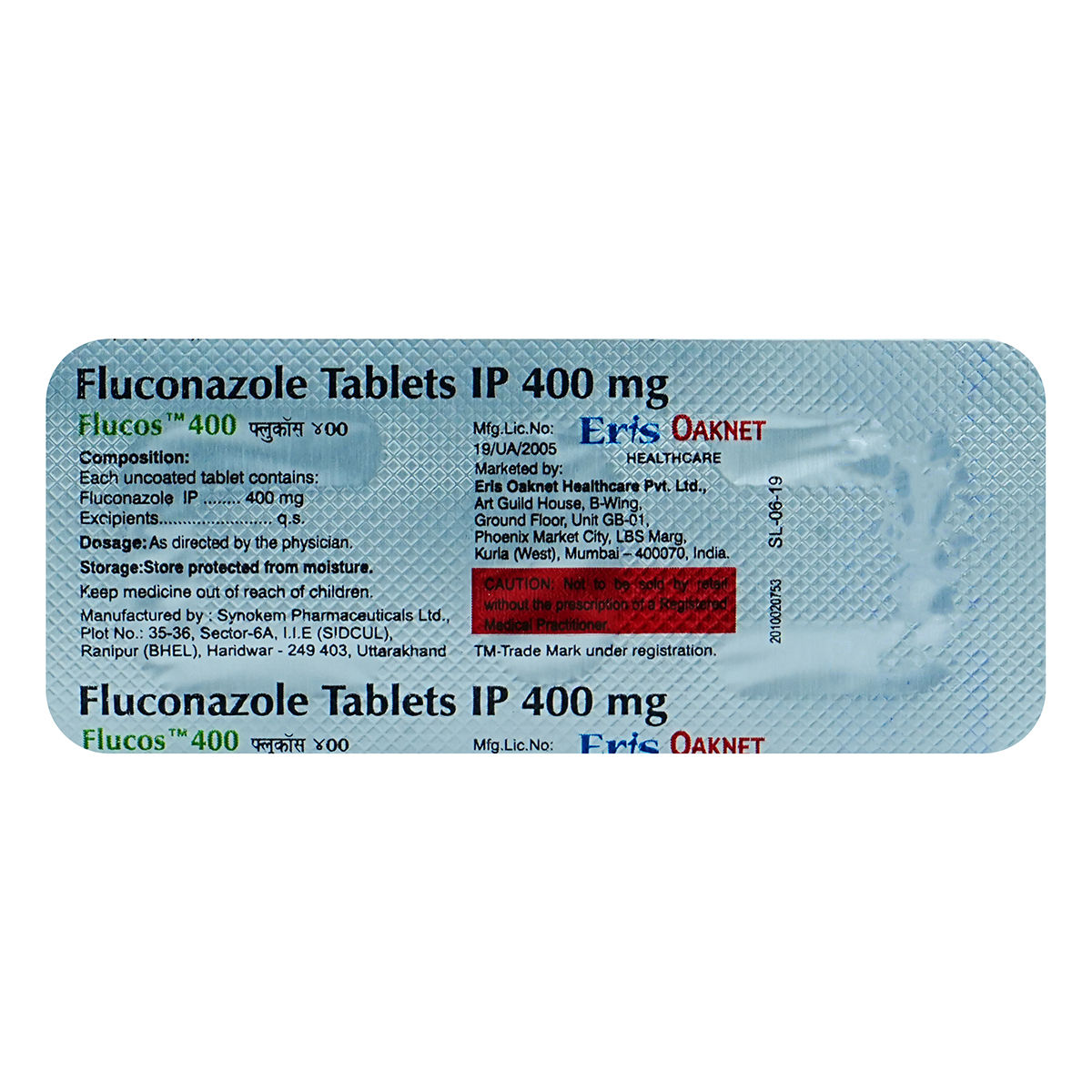AF-400 Tablet 1's


₹25.7*
MRP ₹28.5
10% off
₹24.22*
MRP ₹28.5
15% CB
₹4.28 cashback(15%)
Free Delivery
With Circle membership
(Inclusive of all Taxes)
This offer price is valid on orders above ₹800. Apply coupon PHARMA10/PHARMA18 (excluding restricted items)
Know Your Delivery Time
Provide Delivery Location
Available Offers
 Prescription drug
Prescription drugWhats That

Secure Payment

India's Most Trusted Pharmacy

Genuine Products
Composition :
Manufacturer/Marketer :
Consume Type :
Return Policy :
Expires on or after :
About AF-400 Tablet
AF-400 Tablet is an antifungal medicine that is used to treat a broad range of infections caused due to fungi and yeast. A fungal infection is caused when a fungus invades and affects any part of the body, including the mouth, throat, oesophagus, lungs, bladder, genital area, and blood.
AF-400 Tablet contains ‘Fluconazole’ that kills or prevents fungi or yeast by inhibiting an enzyme in fungi responsible for its normal fat metabolism, which interferes with the formation of the fungal cell membrane. As a result, fungal or yeast cells get killed, or their growth is minimized.
Take this medicine as prescribed by your doctor. AF-400 Tablet has common side effects like headache, diarrhoea, nausea, stomach upset, dizziness, stomach pain, and altered food tastes. These side effects are not familiar to everyone and vary individually. If you notice any side effects that are not manageable, please consult your doctor.
Inform your doctor if you are allergic to AF-400 Tablet or any of its components. Let your doctor know if you have any liver, kidney or heart problems before starting AF-400 Tablet. Pregnant and breastfeeding women should consult their doctor before starting AF-400 Tablet. It is advised to avoid alcohol intake while using AF-400 Tablet to prevent any undesirable effects.
Uses of AF-400 Tablet
Directions for Use
Medicinal Benefits
AF-400 Tablet works by killing the fungus/yeast and preventing its growth by inhibiting the fungal cell membrane formation. It is used to treat various fungal or yeast infections, such as vaginal candidiasis, oropharyngeal candidiasis (thrush, oral thrush), oesophagal candidiasis (candida esophagitis), candida infections (urinary tract infections, peritonitis), and cryptococcal meningitis. Besides this, AF-400 Tablet is also used to prevent candidiasis and coccidioidomycosis in patients who receive cancer or radiation treatment while undergoing bone marrow transplantation. AF-400 Tablet is effective in treating soft tissue and pulmonary infections when compared to other azole antifungal drugs.
How AF-400 Tablet Works
Storage
- Hydrate your body: Drink enough water to prevent dehydration and headaches.
- Calm Your Mind: Deep breathing and meditation can help you relax and relieve stress.
- Rest and Recharge: Sleep for 7-8 hours to reduce headache triggers.
- Take rest: lie down in a quiet, dark environment.
- Cold or warm compresses can help reduce tension.
- Stay Upright: Maintain good posture to keep symptoms from getting worse.
- To treat headaches naturally, try acupuncture or massage therapy.
- Over-the-counter pain relievers include acetaminophen and ibuprofen.
- Prescription Assistance: Speak with your doctor about more substantial drug alternatives.
- Severe Headaches: Seek emergency medical assistance for sudden, severe headaches.
- Frequent Headaches: If you get reoccurring headaches, consult your doctor.
- Headaches with Symptoms: Seek medical attention if your headaches include fever, disorientation, or weakness.
- Inform your doctor about the nausea and discuss possible alternatives to the medication or adjustments to the dosage.
- Divide your daily food intake into smaller, more frequent meals to reduce nausea.
- Opt for bland, easily digestible foods like crackers, toast, plain rice, bananas, and applesauce.
- Avoid certain foods that can trigger nausea, such as fatty, greasy, spicy, and smelly foods.
- Drink plenty of fluids, such as water, clear broth, or electrolyte-rich beverages like coconut water or sports drinks.
- Use ginger (tea, ale, or candies) to help relieve nausea.
- Get adequate rest and also avoid strenuous activities that can worsen nausea.
- Talk to your doctor about taking anti-nausea medication if your nausea is severe.
- Record when your nausea occurs, what triggers it, and what provides relief to help you identify patterns and manage your symptoms more effectively.
- Drink water or other clear fluids.
- To prevent worsening of pain, limit intake of tea, coffee, or alcohol.
- Include bland foods like rice, toast, crackers, and rice in your diet.
- Avoid lying down immediately after eating as it may cause indigestion or heartburn.
- Avoid acidic and spicy food as it may cause indigestion.
- Inform Your Doctor: Notify your doctor immediately about your diarrhoea symptoms. This allows them to adjust your medication or provide guidance on managing side effects.
- Stay Hydrated: Drink plenty of fluids to replace lost water and electrolytes. Choose water, clear broth, and electrolyte-rich drinks. Avoid carbonated or caffeinated beverages to effectively rehydrate your body.
- Follow a Bland Diet: Eat easy-to-digest foods to help firm up your stool and settle your stomach. Try incorporating bananas, rice, applesauce, toast, plain crackers, and boiled vegetables into your diet.
- Avoid Trigger Foods: Steer clear of foods that can worsen diarrhoea, such as spicy, fatty, or greasy foods, high-fibre foods, and dairy products (especially if you're lactose intolerant).
- Practice Good Hygiene: Maintain good hygiene to prevent the spread of infection. To stay healthy, wash your hands frequently, clean and disinfect surfaces regularly, and avoid exchanging personal belongings with others.
- Take Anti-Diarrheal Medications: If your doctor advises, anti-diarrheal medications such as loperamide might help manage diarrhoea symptoms. Always follow your doctor's directions.
- Keep track of your diarrhoea symptoms. If they don't get better or worse or are accompanied by severe stomach pain, blood, or dehydration signs (like extreme thirst or dark urine), seek medical help.
- Preventing Vomiting (Before it Happens)
- Take medication exactly as prescribed by your doctor. This can help minimize side effects, including vomiting.
- Having a small meal before taking your medication can help reduce nausea and vomiting.
- Talk to your doctor about taking anti-nausea medication along with your prescribed medication.
- Managing Vomiting (If it Happens)
- Try taking ginger in the form of tea, ale, or candy to help alleviate nausea and vomiting.
- What to Do if Vomiting Persists
- Consult your doctor if vomiting continues or worsens, consult the doctor for guidance on adjusting your medication or additional treatment.
- Skin rash caused by allergies is due to irritants or allergens. Therefore, avoid contact with such irritants.
- Consult your doctor for proper medication and apply an anti-itch medication. Follow the schedule and use the medication whenever needed.
- Protect your skin from extreme heat and try to apply wet compresses.
- Soak in the cool bath, which gives a soothing impact to the affected area.
- Your doctor may recommend regular liver function tests (LFT) to monitor liver enzyme levels.
- To support your liver, eat a healthy diet with lots of fruits, vegetables, lean proteins, and healthy fats.
- Avoid eating processed meats, sugary foods, and unhealthy fats.
- Limit your alcohol consumption, since too much can worsen liver function and contribute to high levels of Alkaline Phosphatase (ALP).
- Stay active with regular exercise, drink plenty of water, and try to avoid harmful chemicals that can damage your liver.
- Quit smoking to lower the risk of elevated ALP levels.
What if I have taken an overdose of AF-400 Tablet
Drug Warnings
Please inform your doctor if you use any prescription, or non-prescription medicines, including vitamin and herbal supplements before using AF-400 Tablet. Do not use AF-400 Tablet if you are allergic to AF-400 Tablet or any of its components. Let your doctor know if you have any liver, kidney, or heart problems before starting AF-400 Tablet. This medicine may not be suitable for some people who have a weakened immune system, diabetes, cancer, or low blood magnesium or potassium levels; however, please seek medical advice. Pregnant or lactating women should consult the doctor before taking the AF-400 Tablet. Do not drive or operate machinery if you experience dizziness or other side effects that may affect your mental ability to drive. Avoid alcohol consumption along with AF-400 Tablet to avoid undesirable effects
Drug-Drug Interactions
Drug-Drug Interactions
Login/Sign Up
Taking AF-400 Tablet with Erythromycin can increase the risk of heart rhythm problems.
How to manage the interaction:
Taking AF-400 Tablet with Erythromycin together can possibly result in an interaction, but it can be taken if a doctor has advised it. However, consult a doctor immediately if you experience dizziness, lightheadedness, fainting, shortness of breath, or heart palpitations. Do not discontinue any medications without consulting a doctor.
When Astemizole is taken with AF-400 Tablet, the body's ability to break down Astemizole may be reduced.
How to manage the interaction:
Taking AF-400 Tablet with Astemizole can lead to an interaction, please consult a doctor before taking it. Do not discontinue the medications without of consulting a doctor.
When Lomitapide is taken with AF-400 Tablet, may increase the blood levels of lomitapide.
How to manage the interaction:
Taking AF-400 Tablet with Lomitapide together can possibly result in an interaction, but it can be taken if a doctor has advised it. However, consult a doctor immediately if you experience any symptoms such as fever, chills, joint pain or swelling, unusual bleeding or bruising, skin rash, itching, loss of appetite, fatigue, nausea, vomiting, dark-colored urine, light-colored stools, and yellowing of the skin or eyes. Do not discontinue any medications without consulting a doctor.
When Eliglustat and AF-400 Tablet are taken together, AF-400 Tablet can significantly increase the blood levels of eliglustat.
How to manage the interaction:
Taking AF-400 Tablet with Eliglustat together can possibly result in an interaction, but it can be taken if a doctor has advised it. However, consult a doctor immediately if you experience any symptoms such as dizziness, lightheadedness, fainting, shortness of breath, slow heart rate, weak pulse, or heart palpitations. Do not discontinue any medications without consulting a doctor.
Co-administration of Ranozaline with AF-400 Tablet may increase the blood levels and effects of Ranolazine.
How to manage the interaction:
Although there is a possible interaction, AF-400 Tablet can be taken with Ranolazine if prescribed by the doctor. Consult the doctor if you experience sudden lightheadedness, dizziness, shortness of breath, fainting, or heart palpitations during treatment with these medications. Do not discontinue the medications without consulting a doctor.
Co-administration of AF-400 Tablet with Bromocriptine may increase the blood levels of Bromocriptine and the risk of side effects.
How to manage the interaction:
Although there is a possible interaction, AF-400 Tablet can be taken with Bromocriptine if prescribed by the doctor. Consult the prescriber if you experience side effects such as nausea, headache, dizziness, drowsiness, or lightheadedness. Do not stop using any medications without talking to a doctor.
When used with AF-400 Tablet with Buspirone may result in sleepiness, lightheadedness, irregular heart rate, depression, unusual thoughts or behavior, or loss of coordination.
How to manage the interaction:
Co-administration of Buspirone with AF-400 Tablet can lead to an interaction, it can be taken if recommended by a doctor. Do not discontinue any medications without consulting a doctor.
Co-administration of Warfarin with AF-400 Tablet can increase the risk of bleeding.
How to manage the interaction:
Although taking AF-400 Tablet and Warfarin together can result in an interaction, they can be taken together if prescribed by a doctor. However, if you experience unusual bleeding or bruising, vomiting, blood in your urine or stools, headache, dizziness, or weakness, consult a doctor immediately. Do not stop using any medications without consulting a doctor.
Co-administration of fentanyl and AF-400 Tablet may significantly increase the blood levels and effects of fentanyl.
How to manage the interaction:
Although taking Fentanyl together with AF-400 Tablet can result in an interaction, they can be taken together if prescribed by a doctor. However, consult a doctor if you have dizziness, fainting, confusion, excessive sleepiness, and/or shortness of breath. Do not stop taking any medication without consulting a doctor.
Co-administration of Alprazolam with AF-400 Tablet may considerably increase the blood levels and effects of Alprazolam.
How to manage the interaction:
Although there is an interaction between Alprazolam and AF-400 Tablet, it can be taken if prescribed by a doctor. Consult a doctor if you experience excessive or prolonged drowsiness or difficulty in breathing. Do not discontinue any medications without consulting a doctor.
Drug-Food Interactions
Drug-Food Interactions
Login/Sign Up
Diet & Lifestyle Advise
Avoid frequent douching to maintain the natural moisture in the vagina.
Use mild soap while taking baths and prefer warm baths.
Avoid harsh products on your skin.
Manage stress, eat healthily, drink plenty of water, exercise regularly, and get plenty of sleep.
Avoid or limit the intake of alcohol and caffeine.
It is advisable to follow a candida diet during yeast infections. This diet excludes sugar, gluten, certain dairy products, and alcohol, and includes low-sugar fruits, non-starchy vegetables, and gluten-free foods.
A very-high sugar or high-carbohydrate diet may increase the count of Candida in some people.
Habit Forming
Therapeutic Class
AF-400 Tablet Substitute

Zocon 400 Tablet 1's
by Others
₹29.70per tabletFlutas-400 Tablet 1's
by Others
₹29.70per tabletFlucos 400 Tablet 1's
by Others
₹29.70per tabletONECAN 400MG TABLET, 2's
by Others
₹29.95per tabletFlufung-400 mg Tablet 1's
by Others
₹29.70per tablet
Product Substitutes
Alcohol
Caution
It is advisable to avoid or limit the intake of alcohol while you use AF-400 Tablet.
Pregnancy
Caution
Please consult your doctor if you are pregnant or are planning to conceive before starting AF-400 Tablet.
Breast Feeding
Caution
AF-400 Tablet should be used with caution and only under a doctor's advice if you are a lactating mother. Please seek medical advice for more information.
Driving
Caution
AF-400 Tablet may sometimes cause dizziness or other side effects that may affect your mental ability to drive. Hence do not drive or operate machinery if you are not mentally alert.
Liver
Caution
Let your doctor know if you have any history of liver diseases when you are prescribed AF-400 Tablet.
Kidney
Caution
Let your doctor know if you have any history of kidney diseases when you are prescribed AF-400 Tablet.
Children
Caution
AF-400 Tablet may be prescribed to children by the doctor, depending on the infection. The doctor decides the right dose for a child based on his/her age and weight.
FAQs
AF-400 Tablet is used in the treatment of fungal infections.
AF-400 Tablet contains Fluconazole, an antifungal drug, which works by killing the fungus/yeast and preventing its growth by inhibiting the fungal cell membrane formation. Thus, it treats fungal infections.
Do not stop using AF-400 Tablet even if you feel better until the doctor's advised course is finished. Your symptoms may improve before the infection is completely cured.
The usual recommendation of dosage for AF-400 Tablet can be for a short time. However, your doctor may prescribe it for a longer time, depending on the type and severity of your infection.
AF-400 Tablet may not be suitable for some people who have a weakened immune system, diabetes, cancer, or low blood magnesium or potassium levels. However, it is advised to seek a doctor's advice before starting AF-400 Tablet if you have a previous medical history.
AF-400 Tablet is a prescription antifungal medication used to treat various fungal infections. Before taking AF-400 Tablet, you must consult a doctor to ensure it's the right medication for your condition and discuss any potential risks or interactions.
No, AF-400 Tablet is not typically used to treat cough, cold, or flu. It's an antifungal medication designed to treat fungal infections, not viral infections like the common cold or flu.
It's always best to follow your doctor's specific instructions regarding when to take Fluconazole. They can provide personalized advice based on your individual needs and medical history.
AF-400 Tablet has common side effects like headache, diarrhoea, nausea, stomach upset, dizziness, stomach pain, and altered food tastes. These side effects are not familiar to everyone and vary individually. If you notice any side effects that are not manageable, please consult your doctor.
AF-400 Tablet can interact with other drugs. Inform your healthcare practitioner of all medications you are taking, including over-the-counter medicines, prescription medications, and herbal supplements.
Take the missed dose as soon as you remember unless it's almost time for your next dose. In this case, skip the missed dose and take your next dose at the regular time. Never take a double dose to make up for a missed one.
Taking more than the recommended dosage does not provide additional relief and can increase the risk of adverse effects.
No, do not use AF-400 Tablet after the expiration date, as they may no longer be effective.
Dispose of unused medicines according to your local pharmacy's guidelines. Do not flush them down the toilet or pour them down the drain.
Certain herbal supplements may interact with AF-400 Tablet. It is important to inform your healthcare physician about all the supplements you use.
Country of origin
Manufacturer/Marketer address
Customers Also Bought
Disclaimer
Author Details
We provide you with authentic, trustworthy and relevant information

























